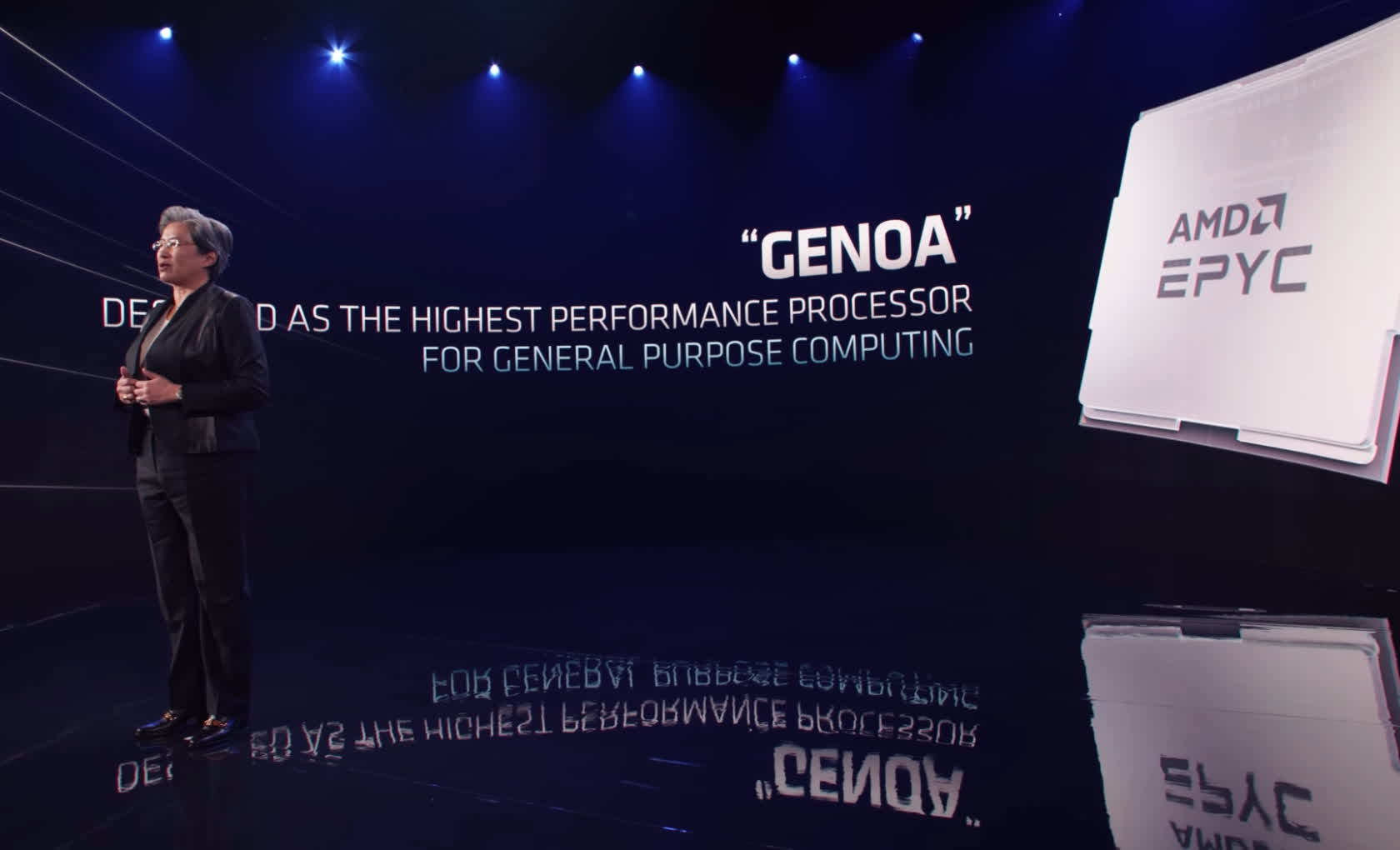In context: Late last year, AMD announced the fourth-gen Epyc series, codenamed Genoa. It's now escaped from AMD's labs and is passing through the hands of leakers before it can make its way onto the open market in the coming months.

According to AMD CEO Lisa Su's keynote last year, Genoa processors should have up to 96 cores based on the Zen 4 architecture and use the TSMC 5nm node. They're supposed to have twice the density and power efficiency of their preceding series, Milan, and 25% more performance overall.
Yuuki Ans, a prolific leaker in the high-performance compute sector, has revealed a spreadsheet containing some of the specs of eighteen models. His leaks seem to come from AMD's partners and are usually good, but the finer details, like clock speeds and TDPs, aren't final yet and could change.
Some processors are only referred to as engineering samples, abbreviated as ES in the tables below. In cases where P and non-P models have identical specs, the two versions are condensed into one row.
8-12 chiplets
| Model | Cores / Threads | Base Clock Speed | TDP | L3 Cache |
|---|---|---|---|---|
| Epyc 9654P | 96 / 192 | 2.00 - 2.15 GHz | 360W | 384 MB |
| ES | 96 / 192 | 2.00 - 2.15 GHz | 320 - 400W | 384 MB |
| ES | 84 / 168 | 2.00 GHz | 290W | 384 MB |
| Epyc 9534 | 64 / 128 | 2.30 - 2.40 GHz | 280W | 256 MB |
| ES | 64 / 128 | 2.50 - 2.65 GHz | 320 - 400W | 256 MB |
As you'd expect, higher core counts are met with higher TDPs and lower base clocks. In this bracket, Genoa has similar base clocks to Milan but higher TDPs, even for the 64-core models.
4-6 chiplets
| Model | Cores / Threads | Base Clock Speed | TDP | L3 Cache |
|---|---|---|---|---|
| Epyc 9454(P) | 48 / 96 | 2.25 - 2.35 GHz | 290W | 256 MB |
| ES | 48 / 96 | 3.20 - 3.40 GHz | 360W | 256 MB |
| Epyc 9354(P) | 32 / 64 | 2.75 - 2.85 GHz | 280W | 256 MB |
| ES | 32 / 64 | 3.20 - 3.40 GHz | 320W | 256 MB |
| ES | 32 / 64 | 2.70 - 2.85 GHz | 260W | 256 MB |
| Epyc 9334 | 32 / 64 | 2.30 - 2.50 GHz | 210W | 128 MB |
Genoa's mid-tier models are clocked far above Milan's, but they also have higher TDPs. Whereas Milan's 48-core and 32-core models were capped at 280W, Genoa's blast past that and exceed 300W.
2-3 chiplets
| Model | Cores / Threads | Base Clock Speed | TDP | L3 Cache |
|---|---|---|---|---|
| Epyc 9274F | 24 / 48 | 3.40 - 3.60 GHz | 320W | 256 MB |
| Epyc 9254 | 24 / 48 | 2.40 - 2.50 GHz | 200W | 128 MB |
| Epyc 9224 | 24 / 48 | 2.15 - 2.25 GHz | 200W | 64 MB |
| Epyc 9174F | 16 / 32 | 3.60 - 3.80 GHz | 320W | 256 MB |
| Epyc 9124 | 16 / 32 | 2.60 - 2.70 GHz | 200W | 64 MB |
Genoa presents some good options at this level, like 24-core and 16-core models equipped with 256 MB cache and base clocks reaching 3.5 GHz. However, they continue the trend of consuming more power than their predecessors. For comparison, Milan's 64-core models had TDPs below 300W, but Genoa's 16-core models reach the 320W threshold.
To power them, Genoa has a new socket called SP5. It can handle up to 700W and will also support Genoa's counterpart for the cloud, Bergamo. Additionally, it supports new features, including 12-channel DDR5 and PCIe 5.0.
Genoa is scheduled for this year and could arrive soon. Bergamo should arrive in the first half of next year.
https://www.techspot.com/news/95240-amd-epyc-genoa-series-leaks-introducing-96-core.html